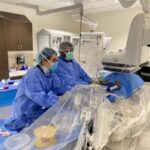 As the 2009 hurricane season approaches, we cannot afford to be complacent in planning and preparing for ourselves, our families and our workplace. During the past three years, we have been fortunate in Florida. The hurricane seasons have been rather gentle with no major large-scale hurricane impacting our state. This should not be taken lightly. The reality is that Florida will always be vulnerable to hurricanes. But this vulnerability is a small price to pay for the Sunshine States year round bounty of sunrays, warm weather and gentle ocean breezes.
As the 2009 hurricane season approaches, we cannot afford to be complacent in planning and preparing for ourselves, our families and our workplace. During the past three years, we have been fortunate in Florida. The hurricane seasons have been rather gentle with no major large-scale hurricane impacting our state. This should not be taken lightly. The reality is that Florida will always be vulnerable to hurricanes. But this vulnerability is a small price to pay for the Sunshine States year round bounty of sunrays, warm weather and gentle ocean breezes.
Even though the media focuses on preparedness during each hurricane season, most people wait until a storm is imminent before they start preparing. Public complacency is even more acute if there were no hurricanes striking Florida the previous year. We may recall the devastation of category 3 or 4 hurricanes, but unless we see them often or directly experience them, we forget. Complacence and lack of preparedness results and this negatively affects our recovery process.
During my recent travels to Mississippis Gulf Coast, I was taken aback by the lingering devastation. Hurricane Katrina may have passed, but her remains are still vivid more than three years later. The haunting feeling of shattered houses, broken trees with clothing flying in the wind, and the scents of loneliness and despair were ubiquitous. When I asked business owners who had rebuilt, why so many people left everything and just walked away, they told me many of them lacked the resources to rebuild, while others didnt plan well for their recovery. Because of that, it was easier for them to take their families and move elsewhere. These victims had no back-up plans or family dialogue about what actions to take if everything was lost.
To avoid the hardships Katrinas victims faced, hurricane preparedness should be a required and ongoing part of life for people who live in vulnerable regions, including Florida. Preparedness is a public health issue we must take seriously – not only when a hurricane is ready to make landfall.
As we await the upcoming hurricane season, we must focus on creating a culture of preparedness. In doing so, we are building ongoing readiness and resilience for ourselves, families, businesses and communities. This culture will help us better deal with any type of public-health emergency.
Our culture of preparedness must include a recovery plan. This resilient plan should focus on saving lives before material belongings. Having assisted in the recovery efforts during the 2008 floods in Iowa, I learned that resilience is critical to the culture of preparedness. Resilience is created by how we respond to disasters such as a hurricanes. It includes taking advice from authorities to ensure we have adequate supplies of food and water; DVDs and flash drives of important documents, including insurance and legal papers; and contact names and phone numbers of family and friends in other states. Resilience also includes having ready-to-go survival kits for each family member and pets in the event of an evacuation. Finally, we need a network of family and friends that will be a part of our back-up plan and recovery.
The hurricane season presents clear and present dangers. We must confront it each year with a resilient culture of preparedness. Its a necessary survival tool to enjoy the beauty of Florida and survive the ravages of Mother Nature.
Post Views: 828
 As the 2009 hurricane season approaches, we cannot afford to be complacent in planning and preparing for ourselves, our families and our workplace. During the past three years, we have been fortunate in Florida. The hurricane seasons have been rather gentle with no major large-scale hurricane impacting our state. This should not be taken lightly. The reality is that Florida will always be vulnerable to hurricanes. But this vulnerability is a small price to pay for the Sunshine States year round bounty of sunrays, warm weather and gentle ocean breezes.
As the 2009 hurricane season approaches, we cannot afford to be complacent in planning and preparing for ourselves, our families and our workplace. During the past three years, we have been fortunate in Florida. The hurricane seasons have been rather gentle with no major large-scale hurricane impacting our state. This should not be taken lightly. The reality is that Florida will always be vulnerable to hurricanes. But this vulnerability is a small price to pay for the Sunshine States year round bounty of sunrays, warm weather and gentle ocean breezes. 


























